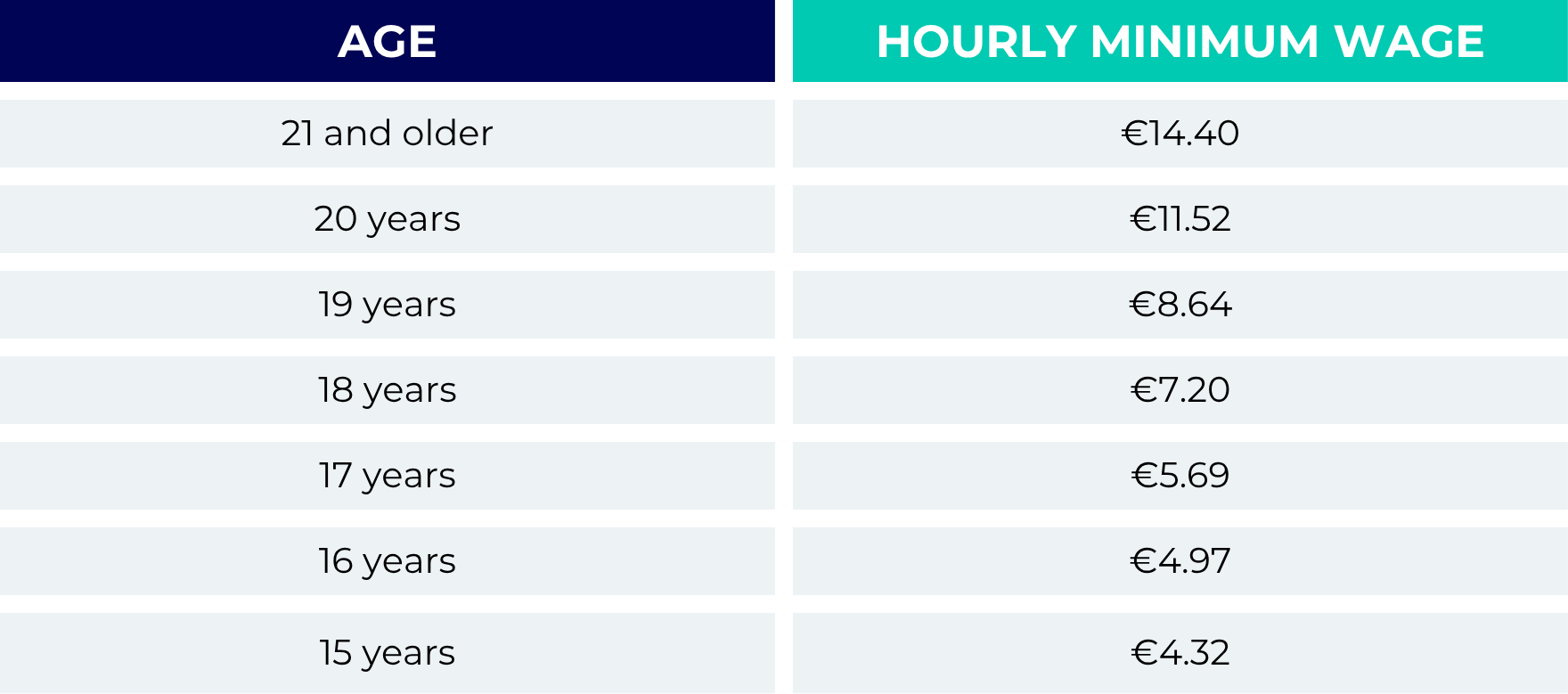10 oktober 2025
Minimum Wage in the Netherlands 2025: Updated Figures and Rules
Understanding the minimum wage in the Netherlands is a fundamental aspect of a fair and functional working relationship. For employees, it represents the legally mandated baseline for their labor. That’s essential for securing a good standard of living and understanding their rights.
For employers, it is a compliance requirement. It’s the foundation of ethical operations and a key factor in attracting talent. Navigating this aspect of Netherlands salary regulations is crucial. It will foster a transparent, trustworthy, and productive environment for everyone involved in the Dutch labor market.
Overview of minimum wage in the Netherlands
The approach to the minimum wage in the Netherlands is designed with one key principle: providing a baseline for a decent standard of living. The system is legally grounded in the Dutch Civil Code and is overseen by the Ministry of Social Affairs and Employment . Its primary role is to protect workers from unduly low pay, thereby serving as a fundamental pillar of the country’s social welfare model.
A pivotal change occurred in 2024. The government abolished the previous method of stating the wage as monthly, weekly, or daily amounts. Today, the law mandates a single minimum wage rate in the Netherlands per hour for all employees aged 15 and above.
Why the move to hourly rates?
This shift to an hourly figure was a deliberate move to create transparency. It ensures that two people with the same hourly pay earn the same for each hour worked, regardless of whether their contract is for 32 or 40 hours a week. This is especially important in a country with a high prevalence of part-time work.
Furthermore, the system is tiered based on age. While workers aged 21 and over receive the full amount, those between 15 and 20 are legally entitled to a percentage of the full wage. This structure aims to strike a balance between protecting young workers and the practicalities of employers hiring less experienced staff.
Minimum wage updates for 2025: Figures and rules
The year 2025 features two key adjustments to the Dutch minimum wage, continuing the policy of biannual indexation to keep pace with economic conditions. The first increase took effect on the 1st of January 2025, raising the hourly rate for adults to €14.06.
Also, the most recent update, arriving on 1st of July 2025, has increased it further to €14.40 gross per hour. This represents a 2.42% rise and is a direct result of the government’s regular wage indexation policy.
The following table outlines the complete schedule of hourly minimum wages for all age groups, effective from 1st of July 2025:

Key accompanying rules and changes
It is crucial to remember that these figures are gross amounts, meaning they are before the deduction of taxes and social security contributions. The actual amount employees receive in their bank accounts will be lower.
Another critical update involves the earnings threshold for certain legal exemptions. For employees who are 18 or older and earn at least three times the maximum monthly value of the statutory minimum wage, employers can deviate from some standard rules.
This threshold, calculated from the new hourly wage, is now €80,848.80 per year.
For these higher-earning employees, an employer may reduce or eliminate the mandatory 8% holiday allowance. Furthermore, the standard regulations on maximum working hours, breaks, and rest periods may not apply. However, critical safety exceptions remain for night shifts and hazardous work.
Impact on workers and employers
The rising minimum wage in the Netherlands sends ripples across the entire economy, bringing both tangible benefits and real challenges.
For workers
- Direct financial boost: The updated minimum wage directly boosts the financial security of employees. The higher gross hourly rate of €14.40 translates into a larger monthly income. It provides a much-needed buffer against the cost of living and helps to ensure your earnings better reflect the value they bring.
- Towards a living wage: This increase is a significant step towards a true living wage in the Netherlands. The extra income can relieve pressure on household budgets, covering essential costs such as groceries, utilities, and rising rent. This contributes to an improved quality of life and reduces financial stress.
- Fair pay guaranteed: The shift to a uniform hourly minimum wage rate in the Netherlands guarantees fairness. Whether you work full-time or part-time, you are now entitled to the same base pay for every hour worked. This system promotes pay equity and ensures your contribution is valued equally.
- Positive ripple effects: The higher baseline wage can positively influence your future earnings. Many collective labor agreements (CAOs) and salary scales use the statutory minimum as a foundation. This increase can therefore lead to upward adjustments in entire wage structures, benefiting you even in entry-level positions.
- Empowerment for part-timers: For part-time workers, a group predominantly comprising women, the hourly system is a powerful tool for fairness. It ensures that your pay is not discounted simply because of your contract type. This strengthens your financial independence and reinforces the principle of equal pay for equal work.
For employers
For businesses, the higher wage means increased operational costs. That’s especially true in small and medium-sized enterprises in sectors like hospitality, retail, and cleaning.
This can be a significant pressure point when hiring employees, thereby forcing difficult decisions. For example, some employers may need to raise their prices to absorb the higher labour expenses. Others might look to improve operational efficiency, streamline staffing, or reduce hours to manage their budgets.
Furthermore, there is a compelling upside for forward-thinking businesses. Offering a competitive wage is one of the most effective strategies for attracting and retaining talented staff. That’s because higher pay can:
- Increase employee motivation
- Reduce costly staff turnover
- Enhance overall productivity
Note that compliance is non-negotiable, since the Dutch Labour Authority actively enforces these rules, and violations can lead to substantial fines. Also, payments must be made via bank transfer to maintain a clear audit trail.
Regional differences and exceptions in the Netherlands
Unlike some larger countries, the Netherlands does not have a system of regional minimum wages. The statutory hourly rates we’ve detailed are applied uniformly across the entire country. That’s from Amsterdam to Rotterdam and from rural Friesland to Maastricht.
The most significant variation comes not from geography, but from sector. Many industries in the Netherlands are governed by Collective Labour Agreements. These are agreements negotiated between trade unions and employer associations. A CAO can set terms and conditions that are more favourable than the national law, including a higher minimum wage.
It is therefore possible for an employee’s CAO-mandated wage to be higher than the statutory minimum wage rate in the Netherlands. If you work in a sector with a CAO that has been declared generally binding, your employer is required to adhere to its terms.
As a professional, it is wise to check whether your role falls under a CAO, as this can positively influence your entire compensation package. Are you unsure about understanding CAOs in the Netherlands? Then you can use our umbrella company service to help you figure out the details.
Future trends in the Netherlands minimum wage policy
The Dutch minimum wage is a constantly changing number, and here are the future trends you can expect:
- Continued biannual adjustments: The system of reviewing and adjusting the minimum wage every six months is a well-established legal practice. This trend is certain to continue, ensuring that the minimum wage keeps pace with the average development of collectively agreed wages in the country. The next scheduled increase will be on the 1st of January 2026.
- Formula-driven calculation: Future adjustments will remain largely automatic. It’s based on a fixed formula that uses economic forecasts from the Dutch Central Planning Bureau (CPB). This technical process limits direct government influence, thereby making wage growth predictable. Adjustments are calculated from expected contract wage growth, which insulates the policy from short-term political changes.
- Focus on the living wage: There are ongoing discussions about ensuring the minimum wage provides a decent standard of living. This is moving beyond a legal baseline to a true living wage.
- Monitoring economic impact: Policymakers will continue balancing worker protection with business competitiveness. A key focus is monitoring whether continued increases inadvertently fuel inflation or discourage hiring. That’s especially true for small businesses with tighter budgets.
- High European standing: The Netherlands is committed to maintaining one of the highest minimum wages in the European Union, currently second only to Luxembourg. This high standard reflects a national consensus on fair pay and is a trend likely to persist.
Final thoughts
Navigating the updated minimum wage in the Netherlands requires diligence from employers and awareness from employees. These changes signify a robust commitment to fair compensation, but they also introduce complex compliance responsibilities.
This is where partnering with a dedicated Employer of Record (EOR) service becomes a strategic advantage. An EOR acts as the legal employer on paper, managing all payroll, legal compliance, and HR tasks. This allows companies to focus on operations while guaranteeing employees their full rights and correct pay.
Ready to ensure full compliance and streamline your Dutch operations? Contact us to get in touch with an expert.
Frequently Asked Questions
How is the Dutch minimum wage calculated for a monthly salary?
As of 2024, there is no official fixed monthly minimum wage. Your monthly pay is calculated by multiplying the hourly rate by the number of hours you work in a month.Therefore, for a standard 36-hour full-time workweek, this is roughly: €14.40 x 36 hours = approximately €2,255 gross per month.
Are there plans to introduce a regional minimum wage in the Netherlands?
There are no current plans to introduce regional minimum wages. The statutory hourly rate is national. However, your actual pay can be influenced by your sector’s Collective Labour Agreement. This can set a higher, industry-specific minimum wage that effectively supersedes the national standard.
Who is not eligible for the minimum wage in the Netherlands?
The minimum wage law applies to all employees aged 15 and over. Key groups that are generally excluded include genuine volunteers, some interns (depending on the educational nature of the placement), and self-employed freelancers.Additionally, misclassifying employees as freelancers to avoid paying the minimum wage is illegal and actively policed.
What should I do if my employer pays less than the minimum wage?
If you suspect you are being underpaid, first try to resolve it informally by discussing it with your employer. If that fails, you can seek advice or file a complaint with the Dutch Labor Authority .They are responsible for enforcing wage laws and can investigate your claim. Furthermore, keeping your payslips and employment contract is vital for evidence.
